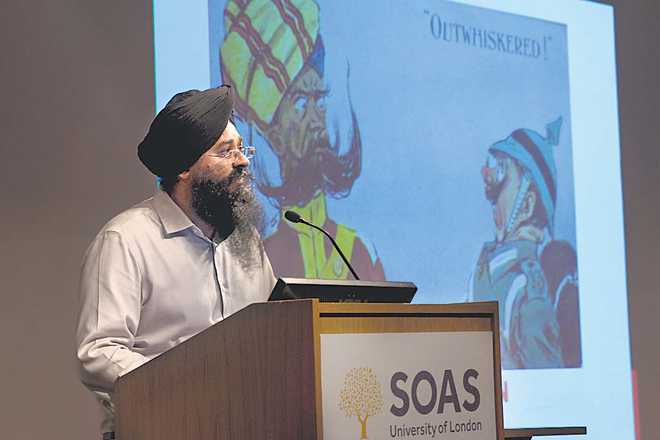For the record, for next generations
A past replete with heroic episodes
Amandeep Madra, Chair of the UK Punjab Heritage Association (UKPHA), has co-authored four books on Sikh history, including Warrior Saints: Three Centuries of Sikh Military Tradition, (IB Tauris, 1999) and Sicques, Tigers, or Thieves: Eyewitness Accounts of the Sikhs (1606-1809), (Palgrave Macmillan, 2004). Rightfully, he has been awarded OBE (Officer of the Most Excellent Order of British Empire) for his contribution to Punjabi and Sikh heritage and culture.
In the mid 1990s, Amandeep travelled to the interiors of Punjab, to its most non-descript villages and got a sense of the state and Sikh heritage. “It is a typical case of reconnecting with the roots, once you have been displaced. At some point in life, one begins to realise the significance of one’s heritage,” says Amandeep, co-founder, UKPHA, an organisation dedicated to safeguard Punjab’s cultural heritage for the coming generations.
Amandeep and his partner started collecting bits on Sikh heritage in London and later published them. “There is no dearth of material on heritage; there is just lack of awareness.” He believes that the same holds true for India as well. “In the West, heritage is a part of the syllabus, and thus it is looked after pretty much naturally.”
A community-based organisation with no permanent staff, the association relies on dedicated volunteers who plan and deliver projects. The volunteers come from different walks of life — designers, writers, historians, researchers, film makers, students, etc. —, eager to both protect and promote heritage.
UKPHA’s upcoming project is an exhibition that aims to explore the rise and fall of the multi-faith, multi-ethnic empire forged by Maharaja Ranjit Singh over his 40-year reign. We will tell that story through a stunning array of over 100 object and artworks from private collections and major institutions. These will include glittering jewellery and weaponry, including items that belonged to the maharaja and his last wife, maharani Jind Kaur.
History must not be forgotten
As a young girl, Dr Opinderjit Takhar, Director of Centre for Sikh and Panjabi studies, University of Wolverhampton, always knew she was a Sikh, but she wanted to unravel what it meant to be one. This became the starting point of her journey to determine her identity.
Today, one of the proud recipients of OBE — awarded for her contribution to higher education and community in Wolverhampton — Opinderjit is helping others understand the Sikh religion and the role it plays in the present scenario.
As a young mother, she is concerned about the disengaging relationship between young Sikhs in England and the gurdwaras. Earlier, on a given Sunday, she rues, “One would find youngsters at a gurdwara. But now you find none.” Opinderjit has been serving as the director of the Centre since March 8,2018, the day it was officially inaugurated by Punjabi singer-actor, Satinder Sartaaj.
She aims to connect Sikh and Punjabi heritage with the modern world through academic research and community outreach. From September 2018, the centre will be teaching MA Sikh Studies, a one-of-its-kind course in the UK. It will offer a fully-funded PhD (£42,000) in Sikh musicology. “We will also welcome applications from self-funded PhD students.”
The centre is currently developing a Giani Training Course for gianis already placed in gurdwaras. Preparations for the International Sikh Studies Academic Conference, to be held in 2019 to mark 550 years of the birth of Guru Nanak Dev, are already underway. “ Besides, various academic programmes, the centre will also be developing Punjabi-learning tools.”
While she strives to make the past relevant again, there are challenges she handles on a daily basis. “All said and done, Sikhi is very patriarchal in nature, women need to shout aloud to be heard, and I believe we are making enough noise with the work that we are doing.”
Centre for Sikh and Panjabi Studies is already getting rave reviews from the Sikh and Punjabi communities. “The British Sikh community has been demanding centre like this for a very long time. Now that the centre has been launched, you can imagine the excitement,” she adds.









